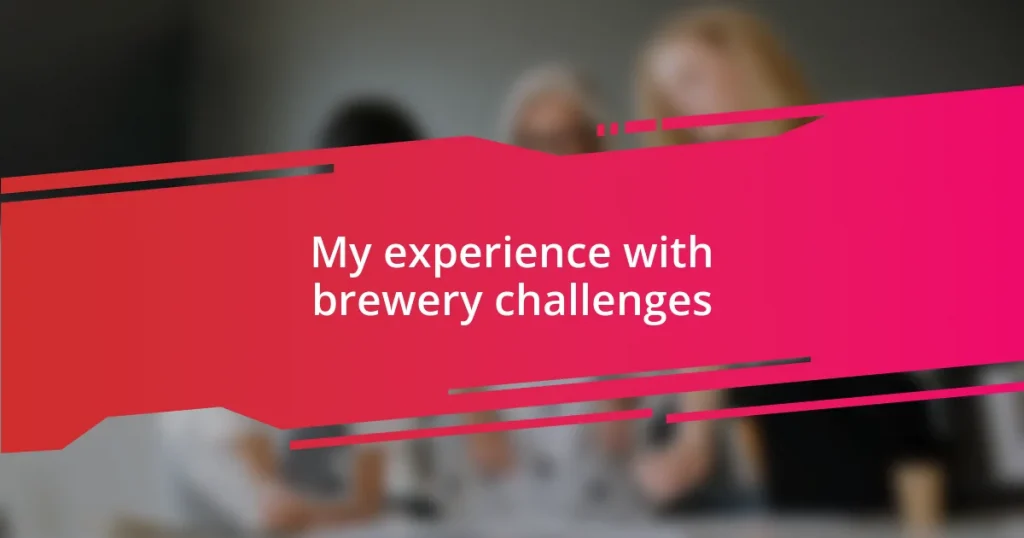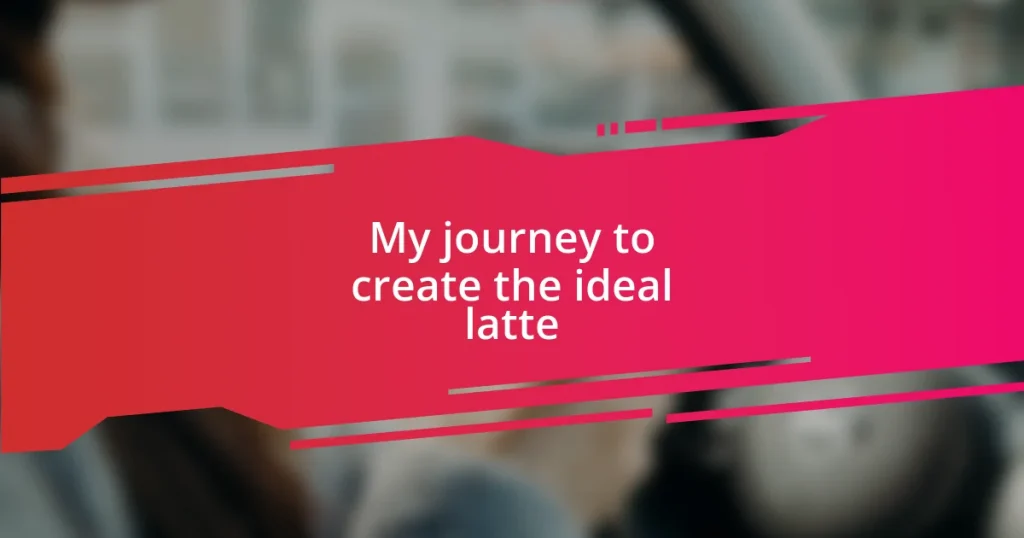Key takeaways:
- Embrace challenges as opportunities for growth, innovation, and improving both brewing techniques and business practices.
- Build strong relationships with suppliers and engage with the community to enhance product quality and brand loyalty.
- Use customer feedback as a critical tool for refinement and maintain resilience to adapt to unexpected setbacks in the brewing process.
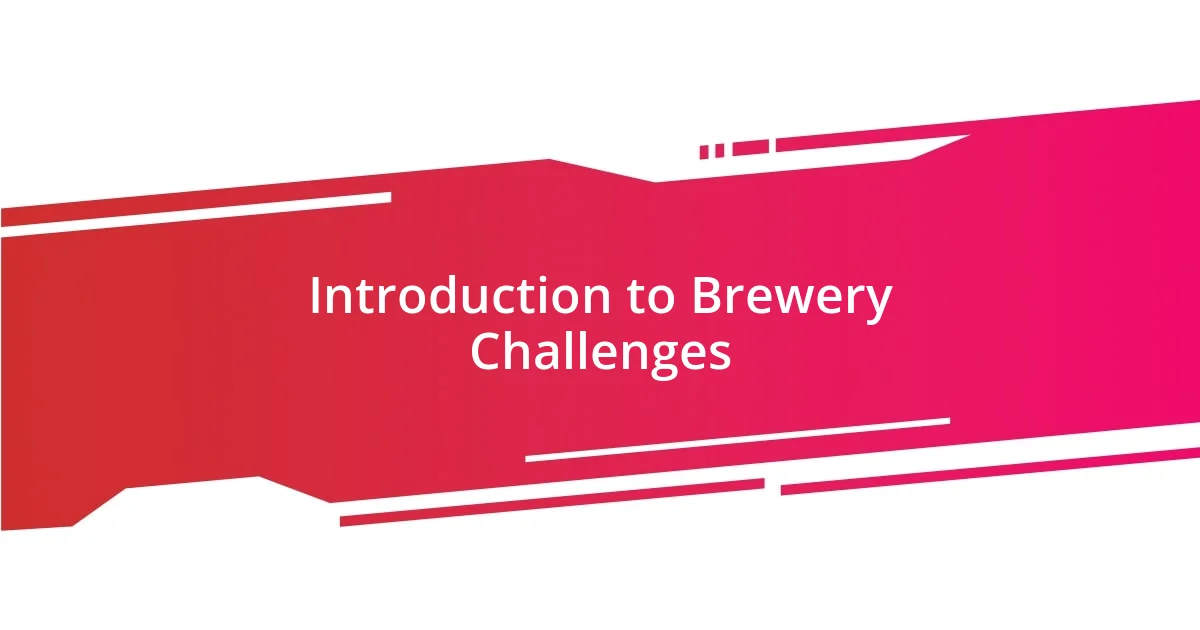
Introduction to Brewery Challenges
Running a brewery can feel like navigating a maze filled with unexpected twists and turns. I recall my first brew day; I was so excited, but the equipment malfunctioned, leaving me frustrated and questioning my decision. It’s in these moments I realized that challenges are just part of the brewing journey.
Every brewery faces obstacles, from supply chain issues to regulatory hurdles. I remember feeling overwhelmed when our local authorities changed the licensing requirements unexpectedly. How do you adapt to something you didn’t see coming? This adaptability is essential for anyone in the industry, as every challenge can lead to growth.
It’s not just about the technical aspects; the emotional toll can be significant. I vividly remember sleepless nights pondering how to maintain quality while scaling production. Challenges can be daunting, but they can also ignite a passion for innovation. Isn’t it fascinating how adversity can foster creativity in brewing?
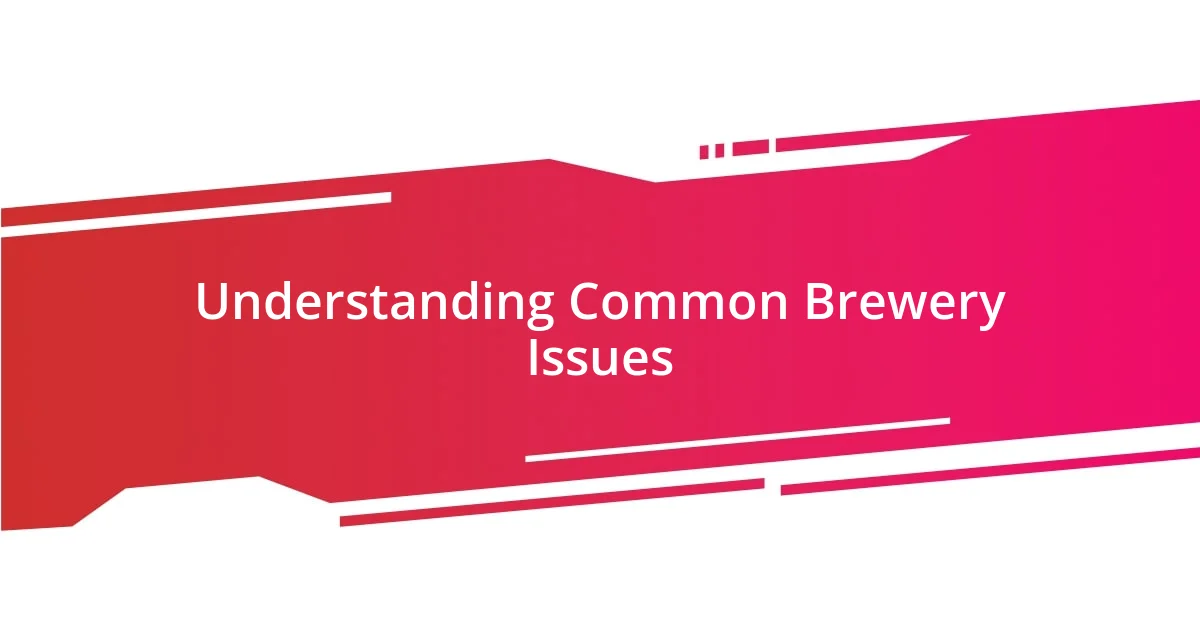
Understanding Common Brewery Issues
Understanding common brewery issues can truly open your eyes to the intricacies of this craft. One particular challenge that sticks with me was the struggle with consistency in recipes. During my first few batches, I struggled with variations in the taste of my beer, leaving me anxious about the quality. I quickly learned that factors like temperature control and ingredient quality play a huge role in the final product, and maintaining those standards is critical to building trust with customers.
Some of the common issues you might encounter include:
- Ingredient Supply Delays: Sourcing consistent quality ingredients can be unpredictable.
- Equipment Failures: Unexpected breakdowns can throw off production schedules.
- Fermentation Problems: Yeast behavior can be erratic, leading to off-flavors or stalled fermentations.
- Regulatory Changes: Staying compliant with evolving laws can be a significant hurdle.
- Market Competition: Differentiating your brew in a crowded market requires constant innovation.
The weight of these complexities can sometimes feel overwhelming, but embracing them can lead to growth in both your brewing skills and business acumen. In my experience, tackling these issues head-on led not only to better beer but also to a deeper appreciation for the craft.
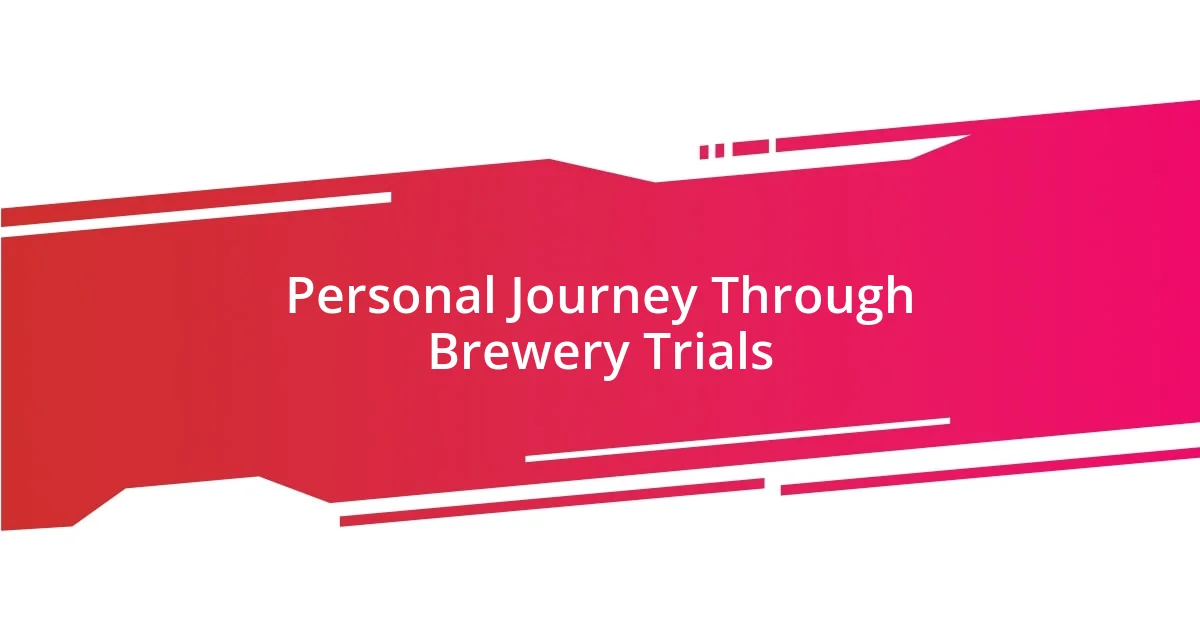
Personal Journey Through Brewery Trials
During my first expansion, I faced a huge challenge when trying to meet increasing demand. I remember waking up at 3 AM, anxiety swirling in my gut about whether we could keep up. It pushed me to think creatively about production efficiency. I started mapping out every step of my brewing process and noticed small tweaks could lead to significant improvements. That was a turning point for me; I learned that sometimes the most pressing challenges force you to innovate in ways you never thought possible.
Another hurdle I faced was the intricacies of hiring the right staff. Initially, I rushed into hiring out of desperation, only to realize later that not every candidate shared the same passion for brewing. I distinctly recall an instance when a new team member didn’t understand the importance of cleanliness in our brewing environment; it led to a batch of beer that had to be dumped. That taught me: hiring is not just about skills but also about finding those who resonate with your vision. It’s a reminder that each trial in the brewery offers invaluable lessons.
I’ve also grappled with customer feedback, which can feel like a double-edged sword. When a loyal customer returned a keg, citing a flavor they didn’t enjoy, my heart sank. Yet, after processing their feedback, I realized it was an opportunity to refine my recipes. I began to embrace feedback as a vital part of the brewing cycle, shifting my perspective to see it as a way to improve rather than as a critique. This change in mindset is one of the most rewarding aspects of my brewing journey.
| Challenges Faced | Lessons Learned |
|---|---|
| Production Scaling | Innovation drives improvement. |
| Hiring Staff | Hire for passion, not just skills. |
| Customer Feedback | Use feedback as a tool for growth. |
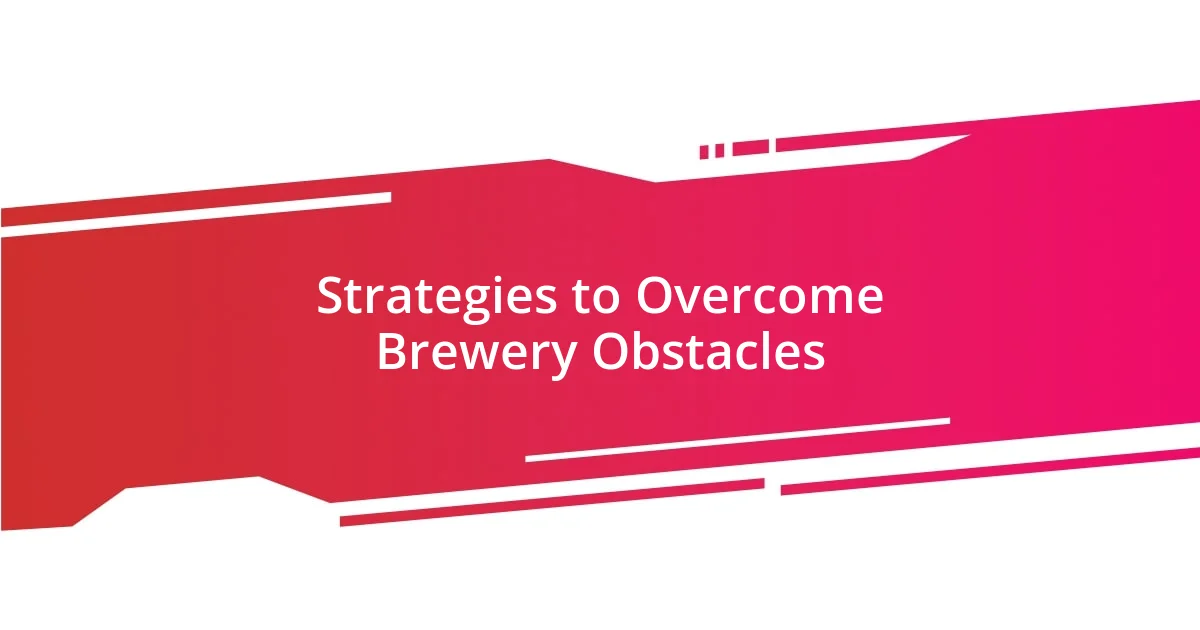
Strategies to Overcome Brewery Obstacles
I often found that the key to overcoming brewery obstacles was in embracing the power of collaboration. There were times when I felt completely overwhelmed by equipment failures. Instead of retreating into isolation, I reached out to fellow brewers for advice. Sharing experiences not only helped me troubleshoot issues but also fostered a supportive community. Have you ever experienced a problem that seemed daunting until you talked it through with someone? That dialogue can lead to solutions that are both practical and innovative.
When regulatory changes hit, I was initially paralyzed by fear of non-compliance. I remember poring over new guidelines late into the night, anxiety gnawing at me. I decided to tackle these changes proactively by attending workshops and networking events. The experience turned what felt like a threat into an opportunity for growth. How often do we let fear dictate our actions? In my case, embracing education and community turned a daunting challenge into a chance to expand my industry knowledge.
Lastly, I learned the art of adaptability through market competition. I once launched a new beer that I was sure would be a hit, only to watch it sit unsold. It hit hard—was my intuition off? Instead of sulking, I looked at what I could pivot. Engaging directly with customers about their preferences led me to rethink both my recipe and marketing strategy. Isn’t that a valuable lesson? Sometimes, the path to success involves accepting that changes may be necessary for improvement.
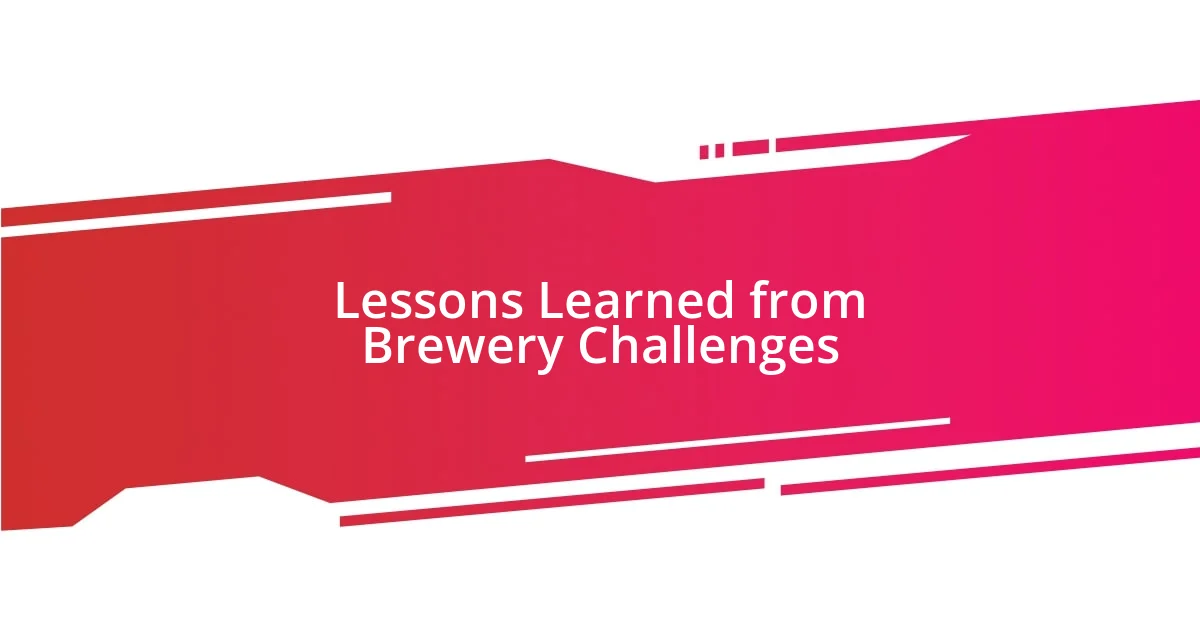
Lessons Learned from Brewery Challenges
One of the most surprising lessons I learned was about the importance of patience in brewing. I recall waiting for a batch of lager to ferment—watching the clock tick slowly seemed unbearable. But as I reflected during these long hours, I realized that great beer isn’t rushed; it develops character over time, just like my business. Have you ever found yourself in a situation where impatience cost you what you truly wanted? I certainly have, and this experience made me appreciate the beauty of the brewing process and, more broadly, the slow journey of growth.
Navigating financial challenges was another eye-opener. There was a moment when I nearly panicked over a cash flow crisis. The fear of not making payroll was real. In those anxious days, I learned to better manage my budget and forecast sales. This experience pushed me to take more control of my financial planning, ensuring that I scrutinize each expense. It’s a tough realization: without financial discipline, even the most passionate venture can fail. Have you faced a similar crisis? Sometimes, these harsh lessons are what steer us toward becoming more astute in our decision-making.
Embracing the unexpected turned out to be a transformative lesson as well. During one festival, our booth ran out of beer faster than anticipated. Initially, I was frustrated and embarrassed, but that evening, I engaged with customers more than ever before while waiting for the next batch. Their excitement prompted me to reevaluate how I connect with my audience. Have you ever found that a setback unexpectedly opened a door? This taught me that sometimes the best moments come from missteps, revealing opportunities to strengthen relationships and deepen brand loyalty.
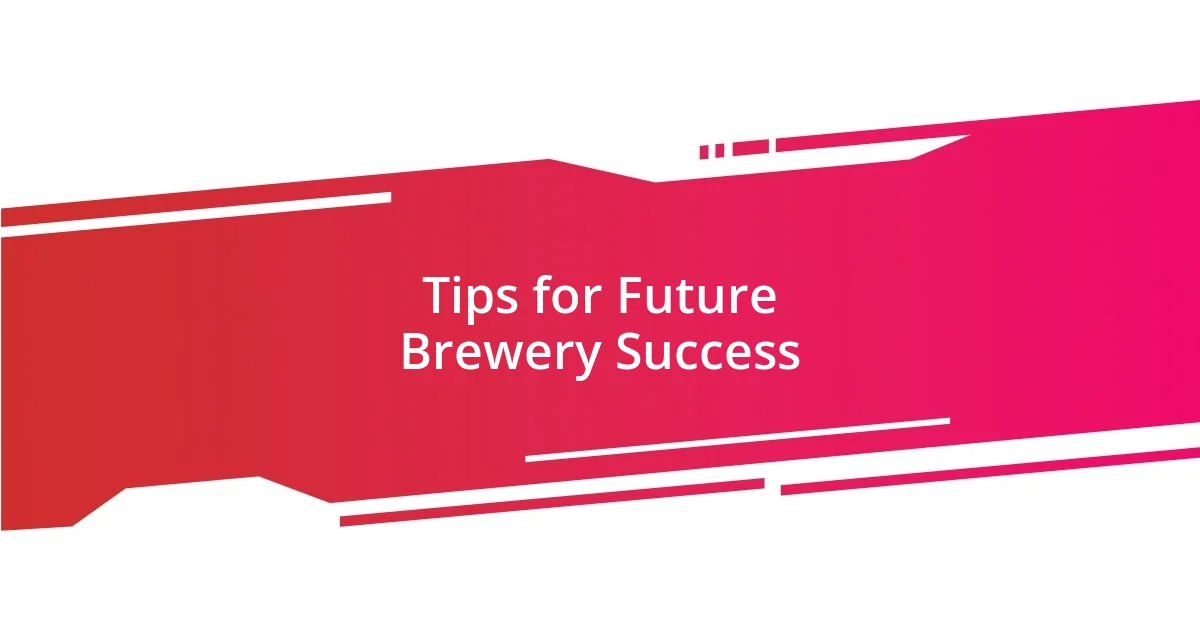
Tips for Future Brewery Success
When it comes to achieving future brewery success, I can’t stress enough the value of continuous learning. One memorable experience for me was attending a craft beer conference where I absorbed so much knowledge from industry leaders. I was surprised to find that while I thought I was well-versed in brewing, there were nuances I had never considered. Isn’t it fascinating how much more we can gain from open-minded exploration? I’ve found that staying curious can spark innovation and keep your brewing techniques fresh.
Another essential tip is to prioritize building strong relationships with suppliers. I learned this the hard way when a key ingredient was delayed, jeopardizing my production schedule. Developing a rapport with my suppliers has transformed our interactions; now, they keep me in the loop about potential shortages and new products. Have you ever thought about how these connections could not only save you time but also enhance the quality of your offerings? In my experience, those relationships are as crucial as the ingredients themselves.
Finally, I believe that incorporating feedback from patrons can be a game changer for brewery success. I recall hosting a tasting event and observing how different individuals reacted to my latest brew. Rather than taking critiques personally, I embraced them, realizing that they offered invaluable insights into how I could refine my craft. Have you ever felt hesitant to ask for feedback, fearing what you might hear? That moment taught me that vulnerability can lead to valuable improvements and a deeper connection to my audience. Listening to those who enjoy your beer can ultimately transform your product and brand.
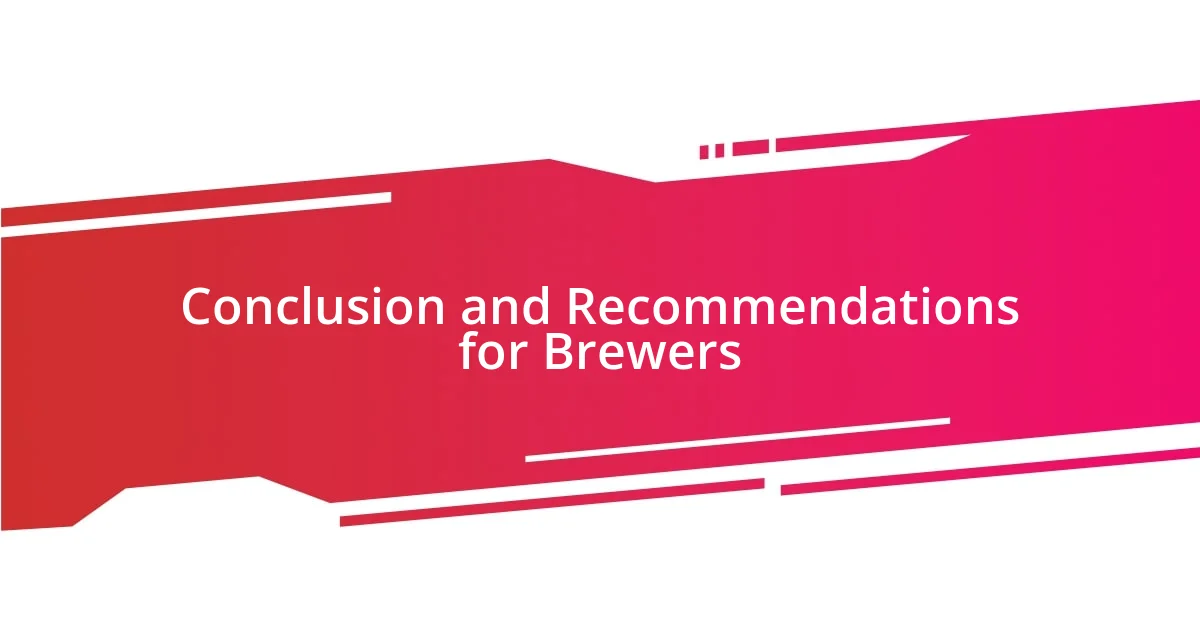
Conclusion and Recommendations for Brewers
Wrapping up my journey through brewery challenges, I find that resilience is at the heart of every successful brewer. There were days when I felt like I was walking on a tightrope, juggling production deadlines and unexpected setbacks. Each time I stumbled, I learned something new about myself and my craft. Isn’t it interesting how obstacles can reveal our true strengths? For brewers, embracing that resilience and adapting to change is crucial for long-term success.
One recommendation I can’t emphasize enough is the importance of community engagement. There was a time when my brewery was just another name in the crowded market. It wasn’t until I hosted local events and reached out to neighboring businesses that I truly found my footing. Connecting with the community not only boosted my brand but created lasting relationships that have been tremendously rewarding. Have you considered how being an active member of your local scene can elevate your business? I can tell you firsthand: it’s about more than just beer; it’s about building a shared experience.
Lastly, never underestimate the power of storytelling in your branding. I remember a particularly slow week when I decided to share the story behind one of my craft beers—its inspiration, ingredients, and the love poured into it—and suddenly, people took notice. They resonated with the authenticity and passion woven into each sip. Isn’t it remarkable how a good story can draw people in and create loyal customers? So, as you brew your next batch, think about how you can connect your audience to the essence of your brand through narratives that inspire and invite them to be part of your journey.










